Quartz countertops are arguably the most durable kitchen material options. The vibrant natural color pattern, durability, and ease of upkeep all add to its demand. As a plus, you do not need any harsh chemical cleaners to clean, maintain your counter. In this article, we will tell you 11 simple steps for cleaning quartz countertops.
It is easy to keep a quartz countertop sparkling and looking brand new. To keep it in the best possible shape, you need to prevent any damage that may occur to the counter due to negligence. That can be done in three simple steps:
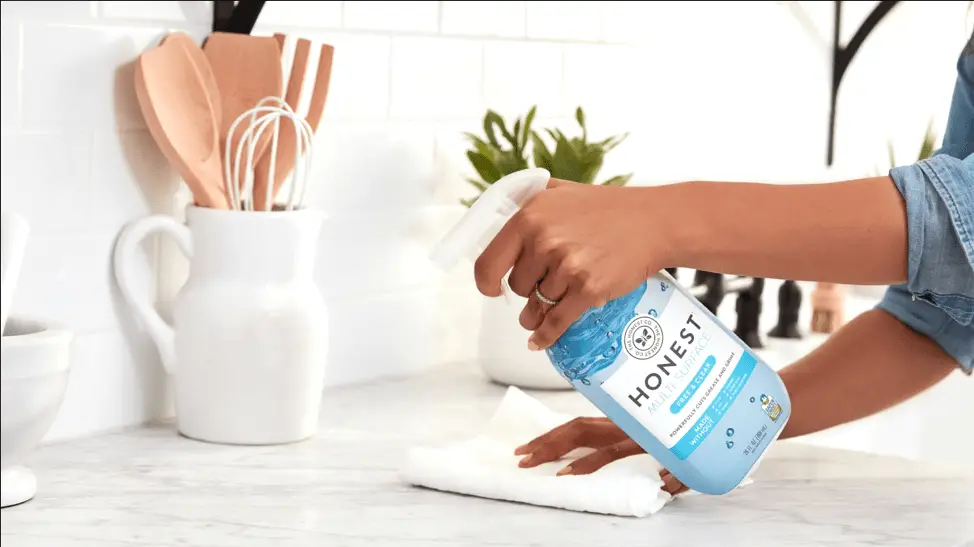
Basic etiquette is to clean your mess as you make it. Do not wait for that soft drink spill to dry on the counter. Leaving spills unattended for a long time can result in stains, even though quartz is stain-resistant.
A mixture of soap in warm water can deal with most stains. Mix mild dishwashing soap in warm water and dip a washcloth in it. Rub it over the stained area in a circular motion. This mixture can clean any stain that has dried out recently.
Using warm water is crucial as it helps get rid of even stubborn stains without the need for excessive scrubbing.
Do not let the soap mixture rest on the surface of the countertop for too long. Adequately wipe it off with a paper towel. Leaving the soap mixture on your quartz surface can wear down the counter, taking away its shine. It is also essential to use a mild soap when you’re cleaning the counter. Detergents with harsh chemicals can ruin your quartz countertop.
Even after wiping away the soap with a paper towel, remnants of the soap may remain on the counter. To ensure that no soap residue is left, rinse the counter with fresh water. You can do this by dipping a clean cloth in freshwater and wiping the counter with it once or twice.
Quartz is nonporous, which means it is resistant to all food stains. No matter what you spill or chop, it’s likely that any liquid spilled will not be absorbed by your quartz countertop. However, cleaning your mess as you make it is a good habit. It saves you a lot of time, effort, and energy that you may spend immersed in deep cleaning later on.
We understand that on some days, you may not feel like wiping up that candle wax or spilled wine. It’s okay; you can let them those stains be and come back to them later. However, you may have to employ some deep cleaning tactics now.
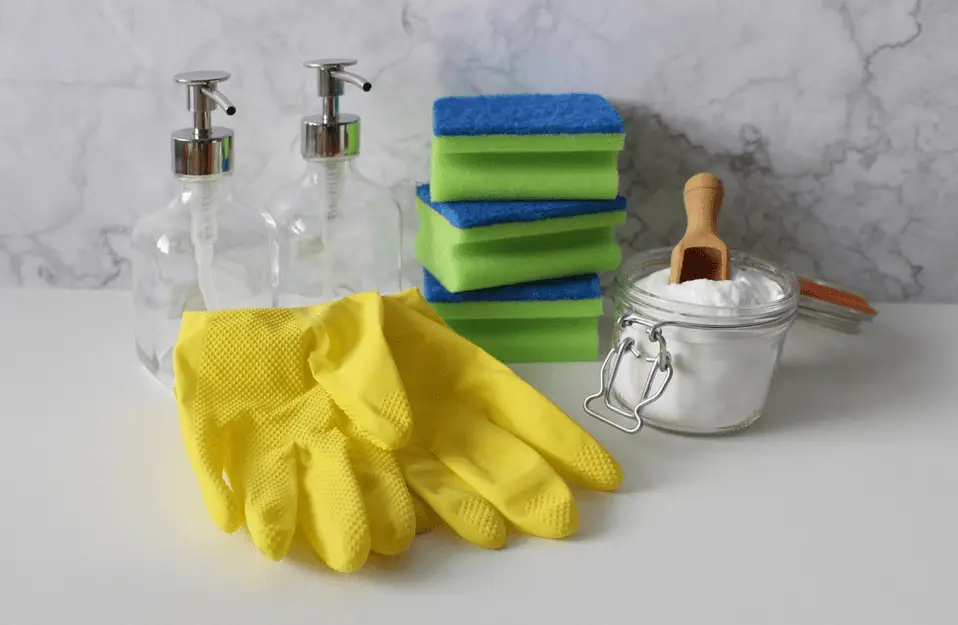
Dried off, unpleasant, sticky stains do not always come off with warm water and soap. You may need to scrape these off. Use a plastic scraper to release them from the counter. Do not ever use a metal scraper as it can scratch your counter. The best way to clean quartz countertops is with a flexible plastic scraper.
For messes that are harder to scrape off, cover them with a paper towel dipped in warm water first. The heat from the water will release the stains, and you can then easily either scrape them off or wipe them away with a little elbow grease.
To get rid of stubborn residue, you can use a vinegar solution. Combine water and vinegar in equal portions in a spray bottle. Spritz the mixture on the entire counter and wipe down with a soft sponge.
The vinegar mixture acts as a natural cleaner and can remove hard water mineral deposits as well as all sorts of food and beverage stains.
The smell of vinegar can be overpowering to some. If you’re one of those people, adding a few drops of lemon or fragrant essential oil of your choice can solve that problem. With this mixture, you will have a natural, pleasant smelling cleaner for your quartz countertop, making its maintenance a piece of cake.
You can also substitute vinegar with hydrogen peroxide. And that’s not all; as an alternative, you can even apply a mixture of baking soda and water over the stain. Let it sit overnight and then rinse with warm water. Baking soda is safe to use on quartz, and you can repeat the process if necessary.
If nothing helps remove that stain, then you can try cleaning the counter with an oil-based surface cleaner. You can even use ordinary rubbing alcohol for stubborn stains that won’t budge.
Apply the remover on the stains and let the remover sit there for a few minutes. Then, wipe it away with a slightly damp cloth or soft sponge. Even if nothing works, a chemical cleaner or rubbing alcohol is guaranteed to get rid of that spatter.
If you want your quartz countertop to stay in its best condition, you need to employ some preventative measures. Follow these steps to ensure that the counter remains sparkling for as long as possible.
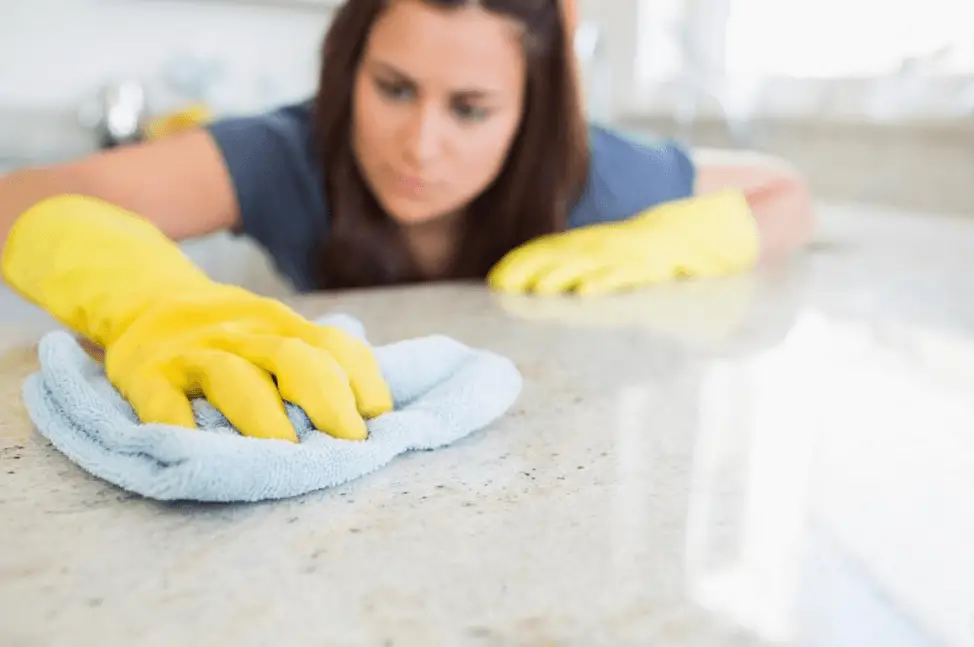
To maintain that glossy look, occasionally wipe your quartz countertops with a glass cleaner. The resin sealant in quartz countertops can become a little murky over time. To stop that from making your counter look aged and dull, use a glass cleaner.
Everyday household products such as Windex, Clorox, or regular glass cleaners can be safely used on quartz. When you’re done using the glass cleaner, make sure to wipe the surface with a wet paper towel or cloth. Doing so wipes away what remains of the cleaner, ensuring a glossy finish for your counter. Do not use a sponge, as it can leave fiber remains on the surface.
Quartz is very durable and scratch, stain, and heat-resistant. However, this does not mean that you can use your counter as a cutting board. Regularly chopping fruits and vegetables can scratch the surface, and fixing it with a light buffing with sandpaper is not an option.
Even when cleaning, before you use any chemical cleaners, try warm water and vinegar. Try scraping off dried gunk with a flexible scraper before you use a chemical cleaner. If you have to use one, then opt for mild glass cleaners or oil-based cleaners.
Using an oil-based cleaner has two benefits:
Quartz is not meant to withstand excessive amounts of heat. The material is heat resistant, not heatproof. Do not place hot pots and pans directly on the counter. If the temperature exceeds 300 to 400 degrees Fahrenheit, it may cause severe cracking. Excessive exposure to heat can also lead to discoloration of the countertop.
Quartz countertops do not do well when exposed to appliances that generate a lot of heat. Make sure you place hot pads or trivets under your toasters and or your hot pots and pans before you place them on your counter.
Cover your windows with a translucent curtain to block off excessive sunlight in your kitchen. The UV rays of the sun can dull the shine of quartz counters, making them unsuitable for outdoor activities and fittings. A discolored counter does not add much resale value to the house either and will cost you a lot to get it changed.
If you do decide to opt for a quartz counter for your outdoor kitchen, then make sure you cover it with a protective screen. It is advised that you keep the counter under a covered patio or install an awning or an overhang to protect it.
To keep your surface looking brand new, you must make sure that the following substances never come in contact with your quartz countertop.
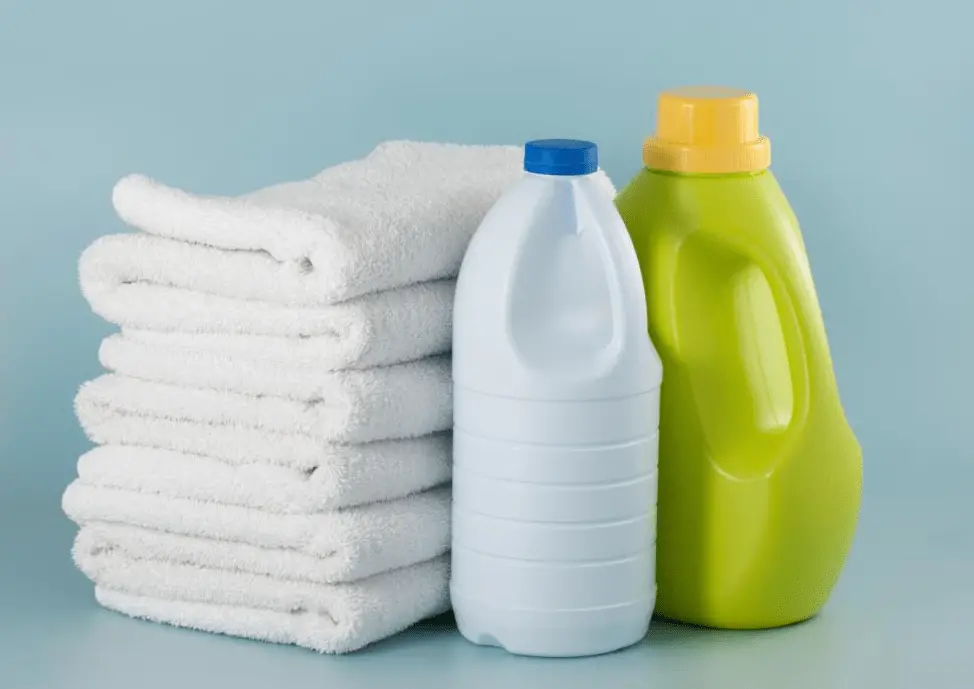
Any cleaner that contains bleach or has a high pH is an absolute no-no. Bleach is abrasive and will wear away your quartz counter immediately. Brief contact with a diluted bleach solution won’t harm your counter. However, wipe it away immediately with warm water. Wipe the surface with clean paper towels and rinse the surface a couple of times to ensure that there are no remnants of bleach on the countertop.
Any solution that contains trichloroethane or methylene chloride is to be strictly kept away from quartz. Do not use your kitchen counter as your DIY workshop table. Paint remover, nail polish removers, and furniture strippers are all to be kept away.
Chemicals and cleaners to avoid include:
Cooking grease keeps on piling up. It may seem like nothing at first, but if you let it be, it can cause significant damage to the counter. Food particles, dirt, and grime all get stuck to the surface because of grease.
Oil bottles placed on counters can leave rim marks on them. You will need to clean your counter with chemical solutions every few days extensively if you keep exposing them to grime and grease. Such regular use of chemical cleaners will cause undue wear on the surface.
Most household cleaners are not approved for use on quartz countertops. They have high pH levels and can destroy the counter very quickly. Manufacturers do not cover damages caused by using cleaners in the warranty, so be extra careful.
If you accidentally end up marking your surface with any such agent, then wipe it away with warm water immediately. Use a glass cleaner or a vinegar solution, but do not let it sit on the surface for very long. The longer it stays, the harder it is to get off and can become an eyesore on an otherwise pristine countertop.
Quartz is nonporous and does not require any sealant. Therefore, the surface does not need to be polished. Doing so is only going to ruin it and cause it to be degenerate quicker. Waxes and polishes contain harsh chemicals that should not be used on quartz countertops at all costs.
Dropping heavy items like big pots and pans on your quartz counter can result in chipping. Even when transporting your counter, take extreme care that you do not put on too much pressure, or otherwise, the counter will chip. Once cracked or chipped, there is no way to fix it other than replacing the entire counter.
To keep your quartz countertop looking aesthetically pleasing and fresh, after cleaning, you should buff it out using a quartz cleaner.
You only need to do this once or twice a month, depending upon the amount of abuse the counter has undergone. Including this step in your cleaning process will ensure you have a clean, sparkling quartz countertop for a very long time.
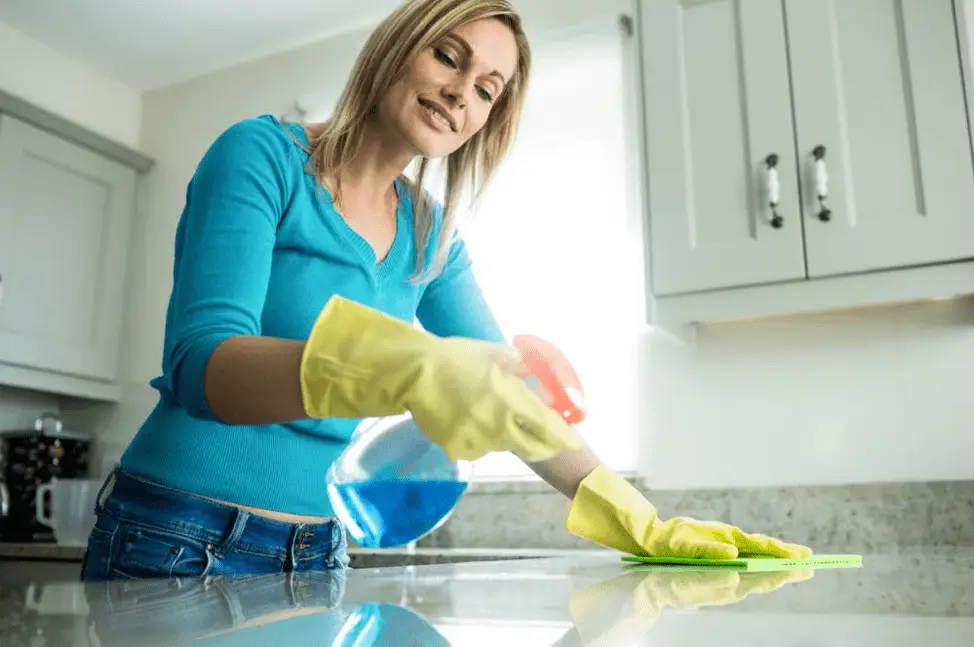
We suggest you use natural remedies before you move on to chemical cleaners. A wide range of options can confound you, and you may end up buying a harmful product. To avoid any mishaps, you can opt for cleaners specially formulated for quartz.
If for some reason, you cannot get your hand on any of the products mentioned above, you can also use one of the following:
These are only a few examples of degreasers and cleaners that are suitable for quartz countertops. There are multiple options available in the market. Make sure you check for harmful chemicals and additives in the product before you decide to use it.

Quartz countertops are also known as engineered stone countertops. They are created by binding together quartz crystals with resin binders. These countertops look strikingly similar to natural stone but are better in every way.
Pros:
Cons
Quartz countertops come in a multitude of color options. Their uniform coloration makes then an ideal choice for any kitchen.
You can choose from shades of gray, brown, white, and black. No matter what the existing color theme of your kitchen is, you can find a quartz countertop to go with it. Most of the colors added to quartz are taken from natural stone shades, but you can even have more shades added to it if you desire.
Once engineered, these countertops are incredibly durable. Wipe the surface with a wet cloth, and it will be good as new. If you want a nonporous option that requires zero upkeep, then quartz is the choice for you.
Quartz countertops are pricier than Formica kitchen countertops. It falls in the same budget bracket as marble and granite, so quartz is not for you if you are looking for kitchen countertops on a budget. These countertops will last you a long time, provided you take care of them.
The best way to care for quartz is to prevent damage before it occurs. The steps may seem tedious, but they go a long way to ensuring that your countertop looks as new as the day it was made.
Cleaning quartz countertops is easy. By simply following these simple 11 steps, you can keep your quartz counter looking like new for years.
